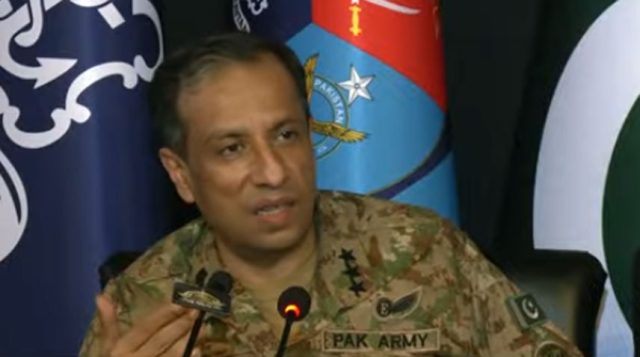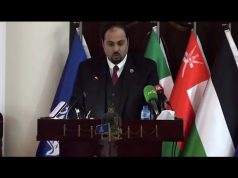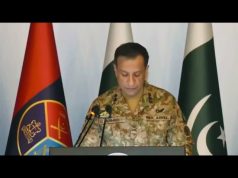RAWALPINDI, Friday, May 23, 2025 (WNP): Director General Inter-Services Public Relations (ISPR) Lieutenant General Ahmed Sharif Chaudhry on Friday unveiled a comprehensive dossier alleging decades of Indian state-sponsored terrorism targeting Pakistan, including direct links to recent deadly attacks on civilians and children in Balochistan.
Addressing a joint press conference alongside Interior Secretary Khurram Agha, Lt Gen Chaudhry traced India’s destabilizing agenda from the 1971 creation of Mukti Bahini to modern-day asymmetric warfare orchestrated through intelligence proxies and digital disinformation.
> “Indian state-sponsored terrorism dates back to Pakistan’s inception — and it continues to this day,” he said, citing detailed evidence including dossiers submitted to the United Nations and confessions from captured operatives.
A bloody trail of terror
The ISPR chief presented slides outlining Indian involvement in terrorist incidents across Pakistan, particularly in Balochistan. He recalled the 2009 Sharm El Sheikh dossier handed to the Indian Prime Minister, followed by further submissions to the UN in 2015 and 2019.
A turning point came in 2016 with the arrest of Indian naval officer Kulbhushan Yadav, who confessed to orchestrating subversive acts inside Pakistan on behalf of India’s Research and Analysis Wing (RAW).
> “His testimony remains a glaring admission of India’s covert warfare against Pakistan,” said Gen Chaudhry.
More recently, he said, surrendered terrorists have admitted to Indian financing and logistical support, implicating RAW in planning daily attacks.
Targeting innocents: From labourers to schoolchildren
The DG ISPR condemned the May 21 terrorist bombing of a school bus in Khuzdar, which killed six children and injured 51 others. He cited other incidents including:
* The April 12 killing of 12 labourers in Nushki
* The April 28 attack that left two dead in Kech
* The February 14 blast in Harnai that killed 10
* The May 6–7 attacks on mosques and gatherings that claimed 40 lives, including 22 children
* The murder of three barbers in Lasbela on May 9
> “This is not merely terrorism — it’s a war on the soul of Pakistan,” he said. “Women and children are now being deliberately targeted.”
He shared audio and video evidence recovered from terrorists, including material linking an operative arrested in Jhelum on April 25 directly to an Indian Army officer.
“Fitna al Hindustan”: India’s proxy network
Gen Chaudhry accused India of reviving its campaign under what he termed “Fitna al Hindustan,” referring to clandestine networks managed through RAW.
> “Having failed in Operation Sindoor, India’s proxies have intensified attacks across Balochistan,” he said. “But Pakistan remains resolute. These designs will not succeed.”
He claimed over 93,000 counterterrorism operations had been conducted nationwide — including 52,887 in Balochistan — resulting in the elimination of 1,018 terrorists in 2024 and 747 so far in 2025.
He alleged that India’s frustration stems from Pakistan’s crackdown on smuggling routes and militant facilitators, along with developmental gains in Balochistan.
> “India is funding groups like the Balochistan Yakjehti Committee (BYC), which has no public support,” he said. “They are howling in despair as Balochistan rises economically.”
War of narratives: Propaganda, water wars, & regional hegemony
The ISPR chief accused Indian media of spreading disinformation to shift blame and distract from domestic failures. He cited the Mianwali incident where false stories and images were circulated by Indian platforms even before investigations began.
He warned that thousands of fake social media accounts have recently been created to amplify anti-Pakistan propaganda.
Gen Chaudhry also criticized India’s attempts to obstruct water flows to Pakistan — a move he termed “a serious breach of international law and the Indus Waters Treaty.”
> “Any unilateral tampering with river flows will provoke a decisive diplomatic and strategic response,” he warned.
Kashmir at the core
The DG ISPR reiterated that peace in South Asia is impossible without resolution of the Jammu and Kashmir dispute.
> “Kashmir is not India’s internal matter — it’s an internationally recognized conflict,” he stated. “Over 700,000 Indian troops suppress the population in IIOJK. Systemic abuse, enforced disappearances, and arbitrary detentions continue unchecked.”
He pointed to India’s broader human rights record, referencing discrimination against Sikhs, Christians, and Dalits, calling it a “global concern, not a domestic issue.”
Pakistan’s stance: Restraint, resilience & resolve
Lt Gen Chaudhry affirmed Pakistan’s commitment to peace but stressed that it would not come at the expense of sovereignty.
> “India misjudged Pakistan’s unity and resolve. We are ready, resolute, and unbroken,” he said.
> “The world must take note: the evidence is clear. India is using terrorism as a strategic weapon — and Pakistan will respond with strength, legality, and unwavering national unity.”




